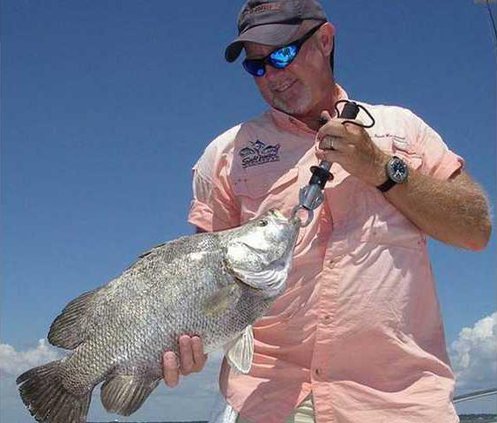BRUNSWICK — The tripletail, a fish popular with anglers but a mystery to scientists, will be the focus of a new study sponsored by Federal Aid in Sport Fish Restoration. Over the next two years, the Georgia Department of Natural Resources (DNR) in partnership with the University of Georgia, hopes to learn more about this odd fish by studying the one-of-a-kind congregation of tripletail found in the waters around Jekyll Island.
Found in warm oceans around the world, tripletail are known for the peculiar behavior of floating on their side at surface near buoyant materials and fixed structure such as channel markers. Since they usually orient themselves on the down current side of an object or structure, they’re also called eddyfish by anglers who find them a worthy opponent on light tackle and great table fare.
For several months each year, the waters just offshore of Jekyll Island come alive with tripletail swimming and drifting on their side in open shallow water. It’s very much a mystery why hundreds, perhaps thousands, of tripletail pick this area of the Atlantic Ocean to call home from late March through July. No such mass of free-swimming tripletail has been documented elsewhere along the Atlantic Coast.
“The abundance of fish off Jekyll Island has given rise to a popular fishery,” says Spud Woodward, Assistant Director for Marine Fisheries, “where the thrills of hunting and fishing are combined as anglers stalk the floating tripletail with light tackle. It’s not unusual to see several dozen boats in the area during spring and early summer. Given the growing popularity of sight-fishing for tripletail, Georgia DNR has made it a priority to better understand this unique gathering of fish.”
Continuing through the summer, tripletail will be caught using hook-and-line gear and a specially modified fish trawl deployed from the Research Vessel Anna. Some fish will be sacrificed for the collection of biological information, while others will be tagged and released. DNR will coordinate the fish collections, while UGA graduate student, Russell Parr, a resident of Savannah, will be responsible for processing and analyzing the samples to determine age and reproductive status.
DNR also hopes to enlist the help of cooperative anglers and fishing guides during the two-year research project. Volunteers can help by tagging tripletail, reporting captures of tagged fish, and by making fresh-caught tripletail available for removal of blood samples or dissection. For more information, call (912) 264-7218.
Found in warm oceans around the world, tripletail are known for the peculiar behavior of floating on their side at surface near buoyant materials and fixed structure such as channel markers. Since they usually orient themselves on the down current side of an object or structure, they’re also called eddyfish by anglers who find them a worthy opponent on light tackle and great table fare.
For several months each year, the waters just offshore of Jekyll Island come alive with tripletail swimming and drifting on their side in open shallow water. It’s very much a mystery why hundreds, perhaps thousands, of tripletail pick this area of the Atlantic Ocean to call home from late March through July. No such mass of free-swimming tripletail has been documented elsewhere along the Atlantic Coast.
“The abundance of fish off Jekyll Island has given rise to a popular fishery,” says Spud Woodward, Assistant Director for Marine Fisheries, “where the thrills of hunting and fishing are combined as anglers stalk the floating tripletail with light tackle. It’s not unusual to see several dozen boats in the area during spring and early summer. Given the growing popularity of sight-fishing for tripletail, Georgia DNR has made it a priority to better understand this unique gathering of fish.”
Continuing through the summer, tripletail will be caught using hook-and-line gear and a specially modified fish trawl deployed from the Research Vessel Anna. Some fish will be sacrificed for the collection of biological information, while others will be tagged and released. DNR will coordinate the fish collections, while UGA graduate student, Russell Parr, a resident of Savannah, will be responsible for processing and analyzing the samples to determine age and reproductive status.
DNR also hopes to enlist the help of cooperative anglers and fishing guides during the two-year research project. Volunteers can help by tagging tripletail, reporting captures of tagged fish, and by making fresh-caught tripletail available for removal of blood samples or dissection. For more information, call (912) 264-7218.

